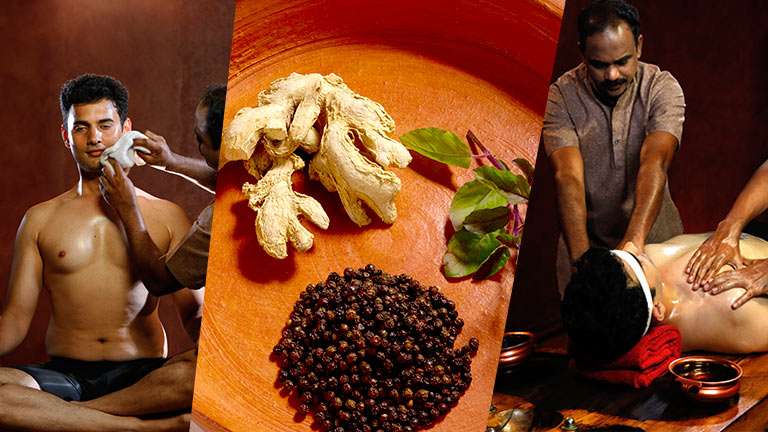
Certificate Course in Ayurveda Panchakarma(CCAP) (Panchakarma Tanta Pravesh)
By NCTA Team Last Updated: January 16, 2026Overview:
The term Panchakarma is derived from Sanskrit, where "Pancha" means five and "Karma" means actions or treatments. Panchakarma is a traditional Ayurvedic detoxification and rejuvenation therapy that aims to cleanse the body of toxins, restore balance, and promote overall well-being. It is a five-step purification process designed to eliminate deep-seated impurities from the body and mind, enhancing both physical and mental health.
Course Description:
The Certificate Course in Ayurveda Panchakarma(CCAP) (Panchakarma Tanta Pravesh) is a practice-oriented program designed to provide comprehensive knowledge of traditional Ayurvedic detoxification and rejuvenation therapies. This course equips students with the essential skills and expertise required to perform various Panchakarma procedures, focusing on holistic healing, disease prevention, and overall wellness.
The curriculum covers the fundamentals of Ayurveda and Panchakarma, including a detailed study of the five purification techniques: Vamana, Virechana, Basti, Nasya, and Raktamokshana. Students will receive hands-on training in Panchakarma therapies and procedures while also learning about diet and lifestyle management in Ayurveda. The course delves into the use of Ayurvedic herbs and medicinal formulations for detoxification and incorporates case studies to provide practical insights and real-world applications.
This certificate program is ideal for Ayurveda students and practitioners, healthcare professionals interested in alternative medicine, wellness and spa therapists, and individuals passionate about Ayurvedic healing. With an affordable fee of ₹10,000, this six-month program offers a valuable opportunity to gain specialized skills in Ayurveda.
Course Curriculum:
The curriculum follows a holistic approach, integrating ancient Ayurvedic wisdom with modern applications to equip students with the essential skills required for professional practice in Panchakarma therapy. Below is the detailed curriculum:
- Introduction to Panchakarma
- Kriya Sharira (Physiology)
- Rachna Sharira (Anatomy)
- Panchakarma procedures
- Dravyaguna Vigyan(Ayurvedic Pharmacology)
- Ayurvedic Diet & Nutrition
- Keraliya Panchakarma Practices (Special Therapies)
- Practical
Career Opportunities:
By the end of this program, students will be able to:
- Understand the fundamental principles of Ayurveda, including Tridosha, Agni, Dhatus, and Srotas.
- Gain knowledge of Ayurvedic physiology (Kriya Sharira) and its impact on health.
- Learn the concept, significance, and benefits of Panchakarma therapy.
- Develop proficiency in performing the five main Panchakarma procedures.
- Master Ayurvedic massage techniques and external detox therapies.
- Design personalized Panchakarma treatment plans for various health conditions.
- Apply Ayurvedic diet and nutrition principles for health and therapy.
- Utilize essential oils and aromatherapy in Panchakarma treatments.
- Understand Ayurvedic philosophy, including Panchamahabhuta and mind-body balance.
- Gain hands-on experience through practical training and clinical applications.
Placement Areas:
Graduates of the Certificate Course in Ayurveda Panchakarma(CCAP) (Panchakarma Tanta Pravesh) have numerous career opportunities in the field of Ayurveda and holistic healthcare. Key placement areas include:
- Ayurvedic Hospitals & Clinics
- Wellness Centers & Spas
- Resorts & Retreat Centers
- Yoga & Meditation Centers
- Rehabilitation Centers
- Personal Ayurvedic Consultant
Salary Expectations:
The annual salary depends on factors such as experience, location, employer, and individual expertise. Below is an approximate salary range:
- Entry-Level: ₹1,00,000 to ₹3,00,000 per year.
- Mid-Level: ₹3,00,000 to ₹5,00,000 per year.
- Senior-Level: ₹5,00,000 to ₹10,00,000 per year.
- Freelance or Private Practice: ₹4,00,000 to ₹15,00,000 per year, depending on clientele and business growth.
Note: This Course Is Not Registered Under NCISM But Is Listed Under Rashtriya Ayurveda Vidyapeeth (RAV)
Course Features
| Course Code | NCTA-365 |
| Duration | 6 MONTHS/270 HOURS |
| Category | Certificate Course in Ayurveda Panchakarma(CCAP) (Panchakarma Tanta Pravesh) |
| Eligibility | 10TH PASS/2-10 Year Experience in Relevant Field |
| Fees | INR(₹) 18000.00 / USD($) 330 |
To know more about our this course, feel free to call us at:
+91 9733600770Ready to Enroll in This Course?
Start your learning journey today and unlock your potential!
Apply Now for This CourseCurrent Job Opportunities for This Course
Ayurvedic Doctor
Sanjeevani Ayurveda New DelhiSanjeevani Ayurveda is looking for Ayurvedic Doctor to join our dynamic team and embark on a rewarding career journey Diagnose patients using Ayurvedic principles and techniques. Develop personalized treatment plans based on patient conditions. Prescribe herbal medicines and therapies. Monitor patient progress and adjust treatments as necessary. Educate patients on Ayurvedic lifestyle practices.
Read More

